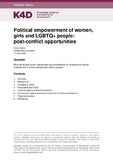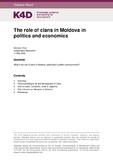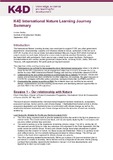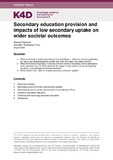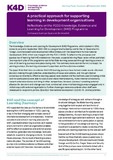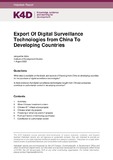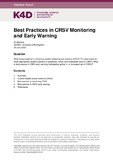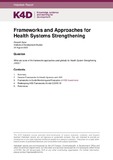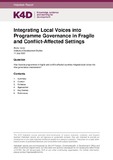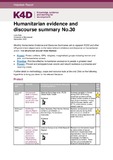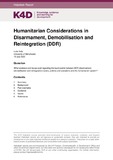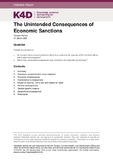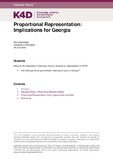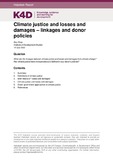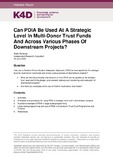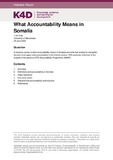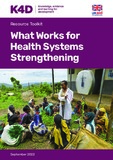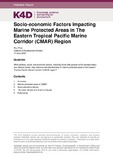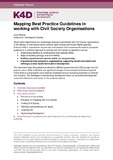K4D: Recent submissions
Now showing items 41-60 of 1138
-
Political Empowerment of Women, Girls and LGBTQ+ People: Post-conflict Opportunities
(Institute of Development Studies, 2022-06-17)The instability and upheaval of violent conflict can break down patriarchal structures, challenge traditional gender norms and open up new roles and spaces for collective agency of women, sexual and gender minorities (SGM), ... -
Lessons Learned From Centre of Government Delivery Units
(Institute of Development Studies, 2022-05-19)A Delivery Unit (DU) can be defined as “a small group of highly-skilled people working at the cent[re] of government who help line ministries achieve outcomes for a number of initiatives that leadership deems ‘mission ... -
The Role of Clans in Moldova in Politics and Economics
(Institute of Development Studies, 2022-05-11)Moldova’s politics, economy, justice system and media are increasingly dominated by a powerful group of elites, led by oligarchs - a new breed of businessmen-politicians who have emerged in the past decade - controlling ... -
K4D International Nature Learning Journey Summary
(Institute of Development Studies, 2022-09)The International Nature Learning Journey was developed to support FCDO and other government departments’ understanding, capacity and influence related to nature, particularly in the run-up to COP-26. A series of on-line ... -
Secondary Education Provision and Impacts of Low Secondary Uptake on Wider Societal Outcomes
(Institute of Development Studies, 2022-08-01)This report explores the current uptake and completion of secondary education globally, with a particular focus on sub-Saharan Africa. The report also explores the wider societal benefits of increased secondary completion ... -
A Practical Approach for Supporting Learning in Development Organisations
(Institute of Development Studies, 2022-09)The Knowledge, Evidence and Learning for Development (K4D) Programme, which started in 2016, comes to an end in September 2022. K4D is a programme funded by and for the UK Government’s Foreign, Commonwealth and Development ... -
Export of Digital Surveillance Technologies From China to Developing Countries
(Institute of Development Studies, 2022-08-01)There is evidence to show that Chinese companies, with some state credit backing, are selling digital surveillance technologies to developing countries, which are then sometimes used in authoritarian practices. However, ... -
Best Practices in CRSV Monitoring and Early Warning
(Institute of Development Studies, 2022-06-30)Conflict-related sexual violence (CRSV) is a major problem, which has significant negative impacts on victims/survivors, wider society and peace prospects. There is growing international recognition of the need to combat ... -
Frameworks and Approaches for Health Systems Strengthening
(Institute of Development Studies, 2022-08-30)While there are multiple discussions regarding what HSS is, the most popular and cited definition is that of the World Health Organization (WHO). It says: “HSS is the process of identifying and implementing the changes in ... -
Integrating Local Voices into Programme Governance in Fragile and Conflict-Affected Settings
(Institute of Development Studies, 2022-07-11)This rapid literature review explores how local people’s views and perspectives on their concerns, needs and capabilities (beyond asking about their experiences with aid) have been integrated into the national-level ... -
Humanitarian Evidence and Discourse Summary No.30
(Institute of Development Studies, 2022-09)This is the 30th monthly Humanitarian Evidence Summary (HUMES) to signpost FCDO and other UK government departments to the latest relevant evidence and discourse on humanitarian action to inform and support their response. ... -
Humanitarian Considerations in Disarmament, Demobilisation and Reintegration (DDR)
(Institute of Development Studies, 2022-07-15)This rapid literature review finds that disarmament, demobilisation and reintegration (DDR) raises a number of humanitarian considerations, centred on the treatment of participants and the unintended consequences of the ... -
The Unintended Consequences of Economic Sanctions
(Institute of Development Studies, 2022-03-21)Economic sanctions are associated with a range of adverse effects, with variable levels of supporting evidence for different kinds of negative consequences. It is frequently challenging to demarcate the boundary between ... -
Proportional Representation: Implications for Georgia
(Institute of Development Studies, 2022-06-25)In a process that spanned over three years, Georgia adopted some important changes to its constitution that is meant to complete the country’s transition from a “semi-presidential to a parliamentary system of governance” ... -
Climate Justice and Losses and Damages – Linkages and Donor Policies
(Institute of Development Studies, 2022-07-19)International attention on debates and issues around loss and damage and climate justice has never been higher, spurred on by global impacts of the ongoing COVID-19 pandemic. This rapid review explores linkages between ... -
Can PDIA be Used at a Strategic Level in Multi-Donor Trust Funds and Across Various Phases of Downstream Projects?
(Institute of Development Studies, 2022-06-30)This rapid review investigated whether PDIA can be used successfully in Multi-Donor Trust Funds (MDTF) at a strategic level and also across various phases of downstream projects (Verheijen, 2017 and World Bank 2018). The ... -
What Accountability Means in Somalia
(Institute of Development Studies, 2022-06-22)This rapid literature review finds that accountability programming in Somalia is focused on working effectively with the country’s hybrid governance. A number of programmes have generated findings on the potential of ... -
What Works for Health Systems Strengthening: An Overview of the Evidence – Resource Toolkit
(Institute of Development Studies, 2022-09)This resource toolkit has been produced by K4D in partnership with the Health Systems Team in the Foreign, Commonwealth & Development Office (FCDO) Human Development Department and renowned global health systems expert ... -
Socio-economic Factors Impacting Marine Protected Areas in the Eastern Tropical Pacific Marine Corridor (CMAR) Region
(Institute of Development Studies, 2022-06-17)This rapid review explores socio-economic and political issues that may affect the effectiveness of the Eastern Tropical Pacific Marine Corridor (CMAR). It specifically focuses on key socioeconomic and governance issues ... -
Mapping Best Practice Guidelines in working with Civil Society Organisations
(Institute of Development Studies, 2022-04-02)This report sets out to map the different guidance documents available on how to work most effectively with civil society in the delivery of international aid in ways that deepen democracy and advance the rights of ...

